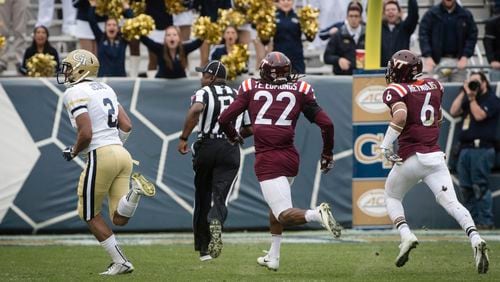The passing attack for Georgia Tech has been inconsistent for most of the season. Averaging less than 100 yards per game through the air on a 40 percent completion rate, the Yellow Jackets have struggled to develop big plays.
Saturday’s win against Virginia Tech appeared to follow that trend after a first half with no completions. But quarterback TaQuon Marshall got it going in the second half with touchdown throws of 60 and 80 yards.
Part of the success can be credited to an offensive line, a unit that has had problems protecting Marshall this season. Tech has given up an average of 2.11 sacks per game, which ranks 79th in the country. When you take into account that it has the third fewest passing attempts overall, the rate of sacks has been troubling. But Saturday, Marshall had a clean pocket to step up and make a couple accurate throws.
“We watched film today, I definitely think pass protection was one of the better aspects of the game playing as an offensive line,” lineman Bailey Ivemeyer, who made his first career start Saturday, said. “We came together, made some good calls, made a few tweaks ... week to week just keep getting better. We’ve worked a lot on sets and stuff just trying to improve that going forward.”
Coach Paul Johnson has been critical of the offensive line’s play at times this season, but he was much more satisfied overall with the performance against Virginia Tech.
“There was some good and bad. ... There were a lot fewer missed assignments, which is good,” Johnson said. “But we still have a lot to clean up, we’re far from perfect.”






